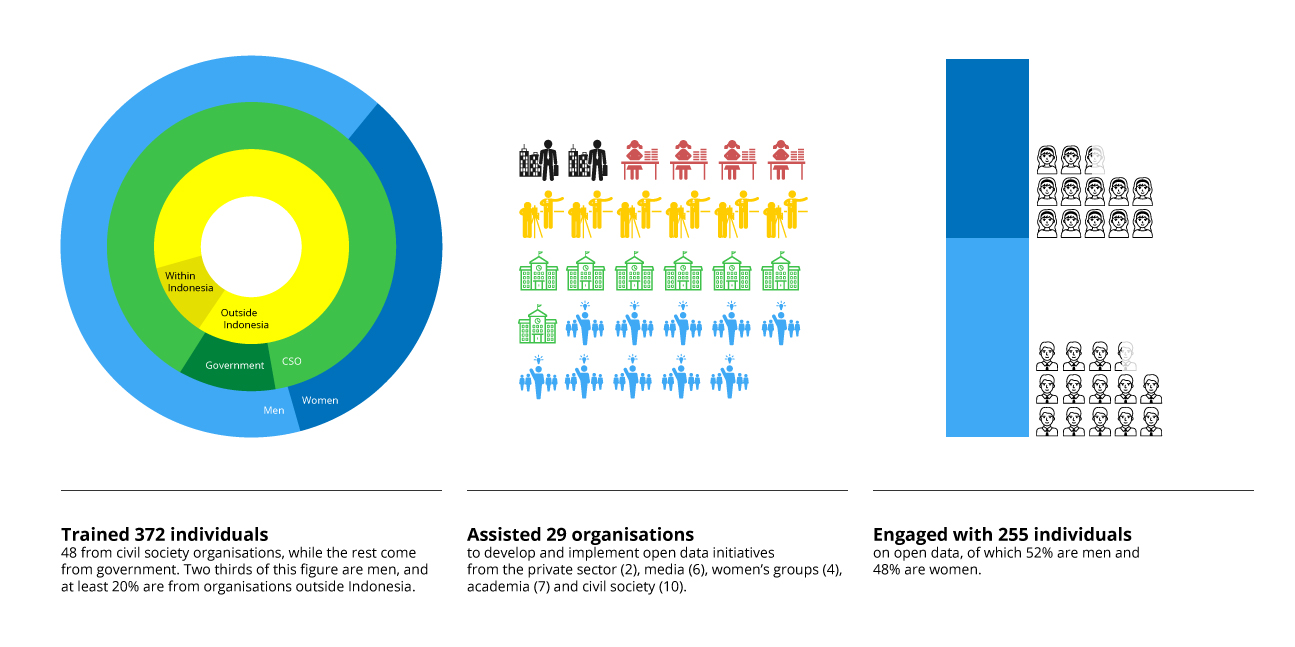
“We are happy that you still continue supporting us and our work”.
This was what Ashkalani, Coordinator of GeRAK Aceh told our Regional Research Manager, Michael Cañares, when they last met. GeRAK Aceh, an anti-corruption organisation based in Banda Aceh, Indonesia is one of our very first local partners when we started our work in open data in Indonesia. Since our launch some four years ago, we have established new partnerships, implemented various open data projects, and worked hard to promote open data to strengthen transparency, improve public service delivery, and enhance citizen participation in governance in Indonesia and regionally.
It is that time of the year again when we reflect and look back at our performance in the previous years. 2015 was our breaking-in year—the first time since the Lab was established that we worked in different countries and implemented trailblazing open data initiatives in at least three subnational governments in Indonesia. In 2016, we expanded our work significantly; we doubled the number of organisations we assisted to implement open data initiatives, and significantly pushed the publication of key datasets at the subnational level.
Finally, in 2017, we were able to expand our reach further regionally by organising and hosting two new regional events: one supported and organised by the World Bank – a training in open contracting for 10 country governments across Asia, and another, a workshop on open data with 25 young leaders from 15 countries across the Asia-Pacific region organised by the International Republican Institute. We also participated 12 major global events, presenting the work of the Lab in different conferences—we even held an exhibit of our photography project with Goethe-Institut Indonesien in Berlin, Germany during Re:publica and Asia-Pacific Week Berlin.
Overall, we:
- Trained 372 individuals (178% increase from last year), 48 of whom come from civil society organisations, while the rest come from government. Two thirds of this figure are men, and at least 20% are from organisations outside Indonesia.
- Assisted 29 organisations to develop and implement open data initiatives coming from the private sector (2), media (6), women’s groups (4), academia (7) and civil society (10).
- Engaged with 255 (52% men, 48% women) individuals on open data and explored ways by which open data can be used to strengthen transparency, improve public service delivery, and promote innovation at the local level.
As a result of this, we were able to:
- Realise open data projects with our partners, for example, an app that geolocates and promotes local products in Banda Aceh, an app that helps the city fire department of Jakarta respond to fire emergencies better and faster, and a disaster data information platform managed by a youth organisation.
- Help a civil society organisation develop a portal to show gender and development data in two villages in Yogyakarta – in Girisuko and Wonolelo – to serve as basis for future work in other villages in the country. They were also able to publish newspapers based on government data disclosed by relevant agencies, which became the basis for discussions at the village level on the planning and use of the Village Development Fund.
- Strengthen the commitment of governments towards openness, including the publication of more datasets, improving transparency of contracting processes, and enhancing data quality.
- Increase the capacity of civil society organisations to access and analyse data to advocate for responsible and accountable planning and budgeting, and better use of public resources for more effective and efficient service delivery.
The Open Data Lab Jakarta, emboldened by these accomplishments, will continue to strengthen our work in Indonesia and the region by moving away from project-driven and narrow-focused implementation, to a more systemic and programmatic way of dealing with development problems using open data and other sources. We will also strengthen our work on data empowerment, by enabling our partners and their constituents to take control over their data, including that of their government, in order to achieve a more transparent, accountable and participatory society.
We will build on our current work and continue to work closely with our partners like Gerak Aceh to bring about the desired change we would like to see and achieve. In the next few months, we will lay out and share our new implementation strategy, so stay tuned and follow us on Twitter @ODLabJkt to keep updated!
Leave a Reply